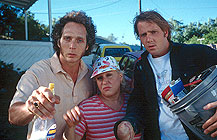|
|
|
|
Drowning
Mona
|
 |
|
Not so many years ago, director Nick Gomez (Laws of Gravity, 1991) would appear in typical documentaries about the mavericks of the American independent filmmaking scene, posturing aggressively about the necessity to work outside the Hollywood system. Now that he's directing episodes of The Sopranos and making a commercially-minded film starring Danny DeVito, Jamie Lee Curtis and Bette Midler, Gomez may be whistling a different tune. Drowning Mona is a strange and sorry project, neither edgy nor entertaining. Queerly, it recalls more than anything else a number of Australian films in the black-comedy-of-manners mode, such as Mushrooms (1995) and Road to Nhill (1997) – movies in which elements of trauma (fatal accidents or murders) serve to unravel the eccentric logic underlying close-knit families and communities. Nobody likes Mona (Midler), so on the day when her brakes fail and she dies in the river, few mourn. Wyatt (DeVito), a cop, keeps digging until he finds odd discrepancies in the case that seem to implicate almost everyone in Mona's life – including his own daughter, Ellen (Neve Campbell), her fiancé, Bobby (Casey Affleck) and indeed Mona's own husband, Phil (William Fichtner). Gomez brings a smug, superior, inner-city New Yorker's sensibility to this drab and loveless tale of ordinary losers. He makes the town of Verplanck, although it is just near Manhattan, seem like a generic Hicksville. Although some of the cast (especially DeVito and Curtis) strive to give their oddball characters some charm and integrity, the rest slide quickly into Coen brothers-style grotesque mannerisms – twitching and flailing to the beat of a bizarre selection of '60s and '70s pop tracks. The attempts at comedy are forced, and the whodunit angle so weak as to be completely uninvolving. Gomez has managed the move from independent to mainstream with far less aplomb and ingenuity than John McNaughton – a filmmaker of similar origins who, in works including Mad Dog and Glory (1993) and Wild Things (1998), manages to retain his exploitation-cinema perversity and subversive sarcasm amidst the trappings of Hollywood glamour and thrills. © Adrian Martin October 2000 |
![]()